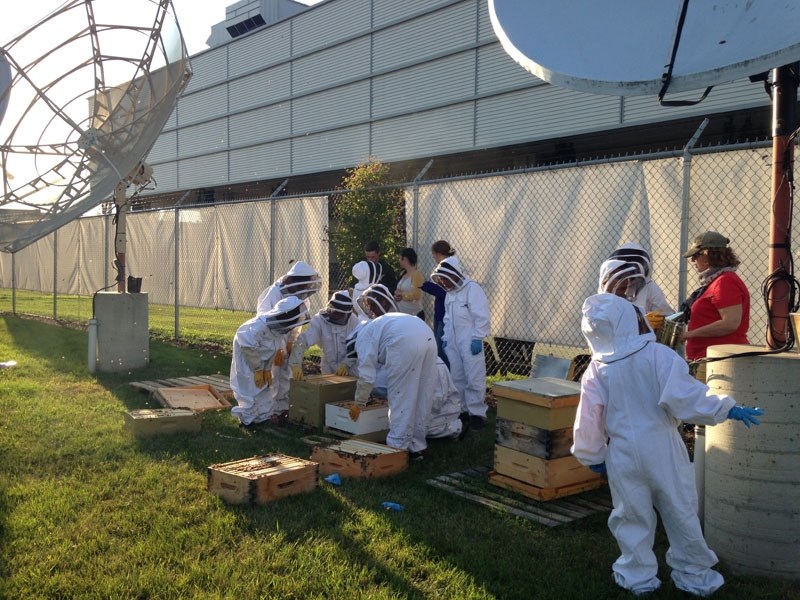A growing interest in urban agriculture has the youthful set abuzz, literally.
Urban agriculture is a hot topic for eco-conscious city dwellers and governments alike – backyard hens and bee hives are on the agenda for many city councils, St. Albert included. Not only is it about environmental stewardship and communing with nature, but the growing and eating of local, fresh fare (eggs and honey in this case) is both trendy and easier on the pocketbook.
Thanks to a bylaw change a couple of years ago, Edmonton’s Northlands had the go-ahead to have bee hives in its urban garden, and area youth got their first chance to take part this year. Just wrapping its inaugural season, The Prince’s Beekeeping Project is a free club for Edmonton and area youth ages 11 to 19. Led by local bee expert Dustin Bajer, students learn the skills required to keep and maintain urban bees. In addition to technical beekeeping, hive building and honey harvesting, there is also a focus on developing entrepreneurship and leadership skills.
“Dustin modelled the program on the beekeeping courses he teaches for adults at the John Janzen Nature Centre, tweaking lessons to account for the long time frame they have together and the wide range in participants’ ages,” said Northlands communications manager Lori Cote. Throughout the summer and fall, 24 youth (including a couple from St. Albert) met once a week to learn about hive inspections, woodworking, and honey processing, among other technical skills associated with beekeeping. Each week, students inspected hives at Northlands and learned between 20 and 40 minutes of theory afterwards.
“The beekeeping club becomes a community where kids are handling frames together, finding queen bees, looking for eggs – other than pulling the honey off, these kids do all the work of a beekeeper over the season,” said Bajer, adding that he saw a change in the kids from the start of this year’s program – at first tentative and scared of getting stung – to keen and confident environmental stewards eager to help put bees to bed for the winter by the end of the program in November.
“There’s a feeling of connectedness to nature and the bee life cycle that evolves in the kids. We’re not a commercial operation – it’s about stewardship and for me, mentoring young people who have an interest in urban agriculture and maybe the next step of entrepreneurial skills, like how to sell or use the honey. Maybe the interest will expand into neighbourhood honey co-ops or urban hens – who knows?” said Bajer.
A program like this is no surprise to St. Albert gardening expert Jim Hole. He sees the interest in urban agriculture among all ages as a growing trend, particularly as scarce water resources and increasing produce costs impact consumers.
“Some people are looking to do these activities as a hobby – others may want to supplement income or just decrease the grocery bill – but it’s a growing movement,” he said.
“We’re at the start of something, so we’d like to get word out in the community and do it all again – we’ve already got the bee suits and tools – we’re ready for another season,” said Bajer.
The Prince’s Beekeeping Project is a sustainable agriculture initiative offered in collaboration with Prince’s Charities Canada and the Edmonton Community Foundation. This project educates local youth on the ecological importance of bees, and provides practical experience in urban beekeeping.
Did You Know …
• Bees are the number one insect pollinator, impacting 35 per cent of the world’s food<br />• There are about 300 known species of bees in the world. Some make honey, some sting and some live in colonies, but all bees pollinate.<br />• There are over 200,000 bee hives across Alberta – the fifth largest producer of honey in the world and by far the largest honey-producing province in Canada.<br />• Canola, alfalfa, lilac, mayday, dandelion and fruit trees all lend flavour to the honey collected by bees in central Alberta.




